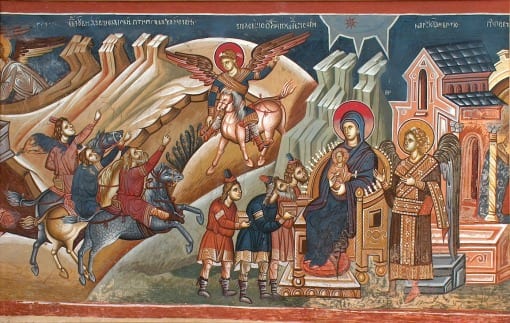
It is Epiphany. The year is 2020.
Scripture doesn’t tell us exactly when the original epiphany happened. It might have been weeks or even months after Jesus’ birth. All we know is that the star we call “the star of Bethlehem” was shining down over the place where the baby Jesus slept and that the wisemen had used it to navigate to Him.
The way we usually tell it, it’s a lovely story of three kings who traversed afar to find a beautiful baby boy, all snugged in a manger-crib. Told this way, it’s a tale wrapped in gauzy pastels, fit for children.
But the truth of it is far different. The first Epiphany happened in a real world ruled by murderous kings who guarded their position with the sword.
The wise men’s search for the newborn king set off a slaughter. They went to King Herod, titular ruler of the nation into which Jesus was born, and asked him where they might find the newborn “king of the Jews.” Given the propensity of dictators throughout history to kill first and ask questions later, the wise men’s guilelessness in this, their optimistic assumption that a king would welcome news of another king in his realm, is more stunning than Herod’s bloodthirsty response to what he saw as a potential threat to his throne.
King Herod tried to find this newborn king, not, as he told the wisemen, that he might worship the Child, but so that he could kill Him. When he failed to locate the Baby, he solved his problem by killing every baby boy under the age of two in the vicinity.
Jesus’ parents, warned by God, had fled across the desert and into Egypt. I can’t imagine what that journey was like; made in terrible haste, and with the knowledge that their baby’s life was at stake, through barren lands with only the provisions they could carry, fleeing to a strange land. It was blind flight in the middle of the night, running for their lives with no idea what they would do or how they would be received when they got to their destination.
That is Epiphany as it really was. It is a story of trusting innocence on the part of the wisemen, pitted against the psychopathic insecurity of a dictator hanging on to power, and two simple young parents trying to save their child. Epiphany is awash in blood, betrayal, grief, fear, blind flight and faith with feet.
It is also the story of how God signified that things had changed forevermore. The old Covenant had been fiercely exclusive, building walls of law around the Chosen People that separated them from the surrounding cultures. They were forbidden to intermarry with their neighbors, told repeatedly not to adopt foreign customs, bow down to foreign gods or build coalitions with their worshippers. They were called to be a people apart, a light to the nations in a time of human sacrifice and child sacrifice to gods of stone and gold.
The birth of Jesus signified something different, a hard 180 degree turn about so complete that it had to signify the beginning of a New Covenant. God had stepped out of the temple, away from the pillar of fire by night and the pillar of smoke by day and into human flesh. He was born of a woman to live like us, as one of us, wholly human, and yet, somehow, wholly divine.
There were angels that sang of peace on earth and a bright shining star to lead the way to where He lay.
And they came. The shepherds and the wisemen; the ordinary working people, and the non-Jews, these representatives of the vast sea of lost humanity, including those outside the chosen people, were the ones God invited to His crib, the ones who showed up to worship the infant Jesus.
There were no priests, no men of wealth and power, at the stable. When the king of the land learned of Jesus’ existence, he did all he could to kill Him. “When you find the Child, come tell me where He is,” Herod commanded the wisemen, in the way of lying liars everywhere, “that I may worship him too.”
The shepherds and the wisemen were invited to see the baby Jesus. God called them to Jesus, and in that calling is both a promise and a revelation. The promise and the revelation have been slowly coming to fruition — with much resistance from those who like to style themselves as the chosen ones — ever since.
The first Epiphany in the year 0 was awash in betrayal, blood, fear and the faithful few who show up in every generation. God stepped into human flesh in the pain-filled human way that we all enter this life. He called the wisemen to His side, to look on Him in the form of a helpless, innocent newborn, and by so doing, He opened the gates to Himself to all of humankind. It was a revelation that He did this, a promise that all would be welcome at Christ’s table.
Epiphany 2020 is much the same. We celebrate the revelation with song and sermon, douse ourselves in incense and recite the creeds. Then we go home and do all we can to bash the promise to dust.
The revelation and the promise that all are welcome at Christ’s table is still strangled, caught in the throats of millions of angry Christians who love to hate their neighbor and kick him or her out of the circle of grace as unworthy of Jesus’ love. This christianity worships the Hallmark card, and denies the reality of Epiphany as it was and as it is.
It fits like a glove that I begin my unretirement on Epiphany. In a very real way, Epiphany is my message.
Jesus Christ is for everyone. He loves all of us. Our only hope is His mercy.
The only way you can look on the face of God and live, is to look at Him, and if you look at Him, you will look into the eyes of someone Who knows you all the way through and loves you anyway.
But there’s more.
You know those people you hate?
Jesus loves them too. In fact, He loves them just as much as He loves you. And if you are His follower, truly His follower, you will love them too. It is not your job to condemn them. It is your job to cooperate with the Holy Spirit in saving them, to be an instrument of Christ’s love to them that points them straight to the heart of His mercy. But if you want to do that, you’ve got to stop hating them. There is no other way.












